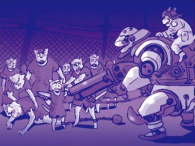Shepherd Republic
The Shepherd Republic (シェパルド共和国, Hepburn: Sheparudo Kyowagoku) is a country made up of multiple sky islands and serves as the setting for Solatorobo. It was originally a single large continent named the Free Lands of Gasco. The country sits southeast from Prairie Kingdom and south of Nipon.
History
Destruction of The Free Lands of Gasco
During the tail end of the Berman invasion over Gasco, their tyrannical leading general Shvein Hax had managed to reawaken Vanargand, a Titano-Machina sleeping beneath Gasco's capital Paresia. Once he had gained control Vanargand would proceed to destroy the entire sky island and create an archipelago.
After a group of children controlling the Taranis managed to put an end to both Hax and Vanargand, the Gasco army would immediately go to the now withdrawn Berman Empire and sign an armistice to acquire their advanced airships. This truce would prove to be extremely beneficial for the country's adapting lives and would become the new normal for centuries to come. As time had passed, what was formally Gasco would later be named "Shepherd" in honor of Malt Marzipan who had led his friends to save the country.
The Founding of Shepherd
Modern day Shepherd was originally a kingdom known as the Kingdom of Shepherd. 611 years before the events of Solatorobo, the Kingdom of Shepherd was drawn into a war with the expansionist Abyssina Empire that lasted for 100 years known as the Hundred Lilies War. With assistance from the Wolf Tribe and the invention of the Robot, the Kingdom of Shepherd emerged victorious, forcing an unconditional surrender from the Abyssina Empire. Additionally, Shepherd benefited economically and politically by offering these new Robots to other countries, gaining over half of Abyssina's former territory.

363 years after the Hundred Lilies War, Felinekos living in former Abyssinan territories currently occupied by Shepherd stage a revolution known as the War of Independence. Driven by Shepherd's constant mistreatment of Felinekos, the revolutionaries manage to take control of the Abyssina Empire's former territory and declare it as the Federation of Abyssina. The War of Independence marked the beginning of the Shepherd royal line's loosening grip on the kingdom. Inspired by the Felinekos' cause, a growing resistance movement began to take shape within Shepherd's boarders as well. Four years after it starts, the Felinekos' revolution succeeds, eventually leading to the people of Shepherd to overthrowing the royal line 14 years later, establishing the Shepherd Republic.
The Incantation Wars
Four years after the founding of the Shepherd Republic, Abyssina rallied its people into going to war with Shepherd while it was still in disarray after their revolution. Abyssina began to invade various areas of Shepherd in a surge. Shepherd's leader, Darian Balas, offered Abyssina some of Shepherd's territory seeking to immediately end the conflict. The Abyssinan army continued to advance, and Darian lost his position for seeming to want to sell out his country. Nable Preutz, a commanding officer of the Shepherd army's northern garrisoned forces, managed to force an entire Abyssinan battalion into a temporary retreat with only a handful of soldiers at his command. This victory inspired many of Shepherd's people to voluntarily enlist in the army. Supported with much greater numbers, Nable led the army to drive back the Abyssinans, threatening to invade their territory. Fearful of invasion, the people of Abyssina turned on their government, blaming them for starting the war. This lead to the proposal of a new prime minister, who reached an agreement with the Shepherd Republic. Shepherd would receive substantial compensation, as well as the island of Millefe in southern Abyssina. Nable was celebrated as a hero, and became the Shepherd Republic's head of state as "Nable I", establishing a new government in his name. This conflict would become known as The 1st Incantation War.

After the exchange, the Felineko population of Millefe are subject to severe mistreatment which they endure for a time. After 65 years since the end of the 1st Incantation War, the Felinekos' tolerance reaches a breaking point when a young boy is slaughtered. Felinekos all begin to revolt immediately, completely destroying a Shepherd military base as well as any homes or businesses owned by Caninus. To the Shepherd Republic, this was nothing but an insurrection of war criminals. Shepherd's head, Nable IV deployed the most advanced mechanized army at his disposal, taking direct command of it himself. Taking notice of the situation, Abyssina began invading Shepherd, confronting their army at the border. The war initially leaned in favor of the Shepherd Republic, however, this quickly changed when Nable IV was killed in action. Despite this, the Abyssinan Army was poorly armed compared to Shepherd, only able to fight Shepherd's robots with swordsmen. Suffering from a high amount of casualties, Abyssina was forced to conscript civilians to fight on the front lines, creating a stalemate between both sides. Shepherd placed Pyrenees Hugo, an 11 year old officer who had a number of victories under his belt from smaller battles, as the new commander-in-chief. Hugo's command led Shepherd's army to an incredibly narrow victory, driving out Abyssina's army. This conflict would become known as The 2nd Incantation War.
Post-war Shepherd
Since the end of 2nd Incantation War, Abyssina and Shepherd have worked on diplomatic relations that have resulted in both nations being at peace for the past 40 years. Part of this diplomacy includes both countries shifting towards an inward political focus, as well as a drastic downsizing of their militaries. This shift has made people more aware of self defense, as well as leading to the creation of Hunters.
Politics
After the revolution, a republic was formed. The Shepherd Declaration of Rights was created, eventually leading to the creation of The Constitution of the Shepherd Republic, a document that has received numerous revisions over time. For centuries, politics in Shepherd were a tool to divide the nobility from the commoners, but the end of The 2nd Incantation War has brought about the rise of democracy in the country. A direct election for president is held every five years, the winner being determined by popular vote. The president is mainly involved in foreign affairs, whereas the prime minister (who is appointed or dismissed by the president) takes care of domestic matters. The president also has the ability to dissolve the parliament, located in Shepherd's capital, Pharaoh.
Each island is considered an autonomous region that pays taxes to the federal government. Autonomous regions each have a representative in the form of a mayor, normally elected directly by the people. However, many autonomous regions have their representatives selected by former nobility and royalty. Parliament is made up of representatives from each autonomous region of Shepherd, who make up the national assembly (lower house). The members of the national assembly also hold a poll to appoint members of the senate (upper house). The national assembly has greater precedence than the senate, the latter mainly serving as an advising body. Despite technically being a republic, many members of parliament are former nobility or people influenced by them. Because of the parliament's heavy traditionalist leaning, change in policy is slow.
